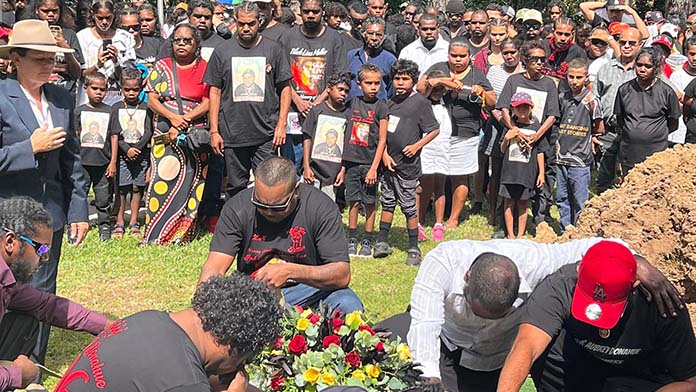On 25 March, in a shocking case of racist brutality, police shot dead Aubrey Donahue, a 27-year-old Muluridji man from Mareeba, Far North Queensland, while he was experiencing a mental health crisis.
Tactical police from the Special Emergency Response Team (SERT), wearing camouflage and carrying military-style automatic rifles, stormed a house in Mareeba and killed him with a single shot to the head.
The SERT were part of a four-hour police operation at the house before the shooting. A spokesperson told the media that police had initially attended the house to investigate a report that a man was threatening self-harm.
Aubrey’s partner was with him during the siege. Police claim that they raided the house to save her from Aubrey.
Aubrey was shot after he allegedly “advanced on officers whilst armed with a knife”, but there is no body-cam footage available of the shooting. Frontline police in Queensland are expected to wear body-cam but, despite having the cameras, SERT officers are currently excused from using them.
Family members have been shown footage by officers taken outside the house at the time of the shooting. This footage captures police discussions which indicate that the steak knife Aubrey was holding was pressed against his own neck.
Family argue that while Aubrey was refusing to let his partner leave, threatening self-harm if she did, he was not threatening to harm his partner or anyone else.
Mareeba police were well aware of Aubrey’s history of mental distress. Unlike previous episodes, however, rather than call family members to comfort Aubrey and talk him down, police had turned the neighbourhood into a war zone and denied access to the house.
Police have provided no explanation as to why there was such a militarised response to the threat of self-harm. The Australian newspaper cited a police source claiming that the SERT, usually stationed in Cairns, were in Mareeba for an “unrelated operation” before being redirected to the house. There is also currently no explanation for the highly unusual head shot that killed Aubrey.
Disgracefully, Aubrey’s twin brother Algen was arrested immediately following the shooting, while screaming in pain at the news of his brother’s death but hurting no one.
Police pinned Algen to the ground, charged him with “resist arrest”, refused to grant bail and held him for two nights in the police cells.
Algen’s charges have now been dropped. But the police presence in Mareeba has remained heavy, including for Aubrey’s funeral, in a clear attempt to intimidate the community.
Black Lives Matter
Aubrey’s family and community mobilised immediately in response to the shooting, demanding answers and justice. At a passionate community meeting held the following day, many people spoke about the racism and police harassment and brutality that is far too common in Mareeba.
Aubrey’s grandmother spoke through tears, saying her people were “not treated like all the white people … we are just as good as them”.
Aubrey’s uncle, Steven Douglas, said he had been speaking on the phone with Aubrey just before the shooting and that Aubrey was planning to give himself up.
Pastor Vincent Mathieson told the crowd, “It’s got to stop—we’ve got to do something as a community. We need to stand together for our rights.”
On 27 March, 500 people marched through Mareeba with T-shirts and banners demanding “Justice for Aubrey” and “Black Lives Matter”. This was a huge turn-out for a small town of just over 20,000. Protesters also marched to the local court and watch house, successfully demanding the release of Algen.
Solidarity protests were held in Brisbane, temporarily shutting down the operations of the local court.
Huge numbers flocked to the funeral service for Aubrey on 20 April, one of the biggest funerals in the town in living memory. Traditional dancers were joined by Maori supporters who performed a powerful haka. Many people wore “Black Lives Matter” T-shirts featuring Aubrey’s image.
Family have asked supporters for a period of calm to allow them to grieve but are planning to call further actions demanding justice.
Despite the Queensland Labor government posturing as supporters of Aboriginal rights, with a formal treaty process underway and high-profile support for the Voice to Parliament referendum, they are intensifying the oppression of Aboriginal communities.
A new “law and order” crack down, requiring the suspension of the Queensland Human Rights Act, will see even more Aboriginal youth locked in prison.
The government has no answer to the widespread poverty, mental health problems and other social crises that result from racism and marginalisation of Aboriginal communities, apart from more police brutality and incarceration.
Real change will come only by building on the brave stand of the community at Mareeba, and others across the country, taking to the streets for justice and self-determination.
By Paddy Gibson






